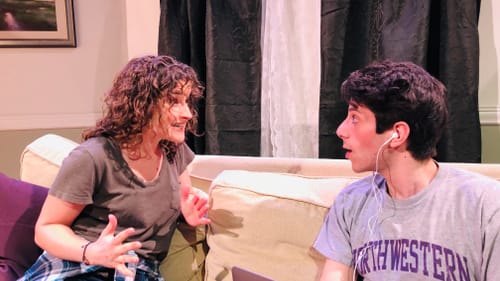Stay in the Loop
BSR publishes on a weekly schedule, with an email newsletter every Wednesday and Thursday morning. There’s no paywall, and subscribing is always free.
What's the deal with millennials?
Beta Male Productions presents ‘The Boomerang Kid’

In 2012, the Pew Research Center found that 24 percent of all adults aged 18 to 34 had spent some time living with their parents after living on their own, for economic reasons. This phenomenon — the so-called Boomerang Generation — inspires a world-premiere play from Beta Male Productions: The Boomerang Kid, written and directed by Dave Orlansky.
The premise of the show is immediately recognizable: 23-year-old Adam Blum (Michael Mina) graduates from college and moves back in with his parents, Bonnie and Sam Blum (Alice Weber and Frank Ingulli). Most of us know someone who was in the same boat — hell, some of us might have been (or still are) in the same boat — but The Boomerang Kid moves quickly from being familiar because we can relate to being familiar because the play is nothing but a cascade of clichés.
The lazy Millennial
There’s an Adam-shaped dent in the Blums’ sofa, since the younger Blum has parked himself perpetually on the middle cushion, earbuds in and laptop out. It’s surprising to learn that playwright/director Orlansky is in his early 30s, because his depiction of Adam feels like the “lazy millennial” trope we’ve seen time and again from older writers.
Adam hasn’t showered in weeks. He won’t change out of his rank sweatpants. He’s not interested in getting a full-time job or an apartment of his own. He’s a freelancer (oh no! the gig economy!) who makes a living doing television recaps for Entertainment Weekly. Although he really wants to write for television, he doesn’t seem to want to do anything to reach that goal. In all honesty there’s a good chance he’s depressed, and not as lazy as he seems — but he’s so one-dimensional it’s hard to tell.
The overbearing Jewish parents
We learn early in The Boomerang Kid that Adam’s parents have been together for 25 years. Adam is 23 and, assuming Bonnie and Sam wed before his birth, that puts their marriage sometime between 1993 and 1996. The median age of marriage in those years was around 27 for men and 25 for women, so the Blums are, at their oldest, in their early 50s: firmly Gen-Xers. And I have never seen a Generation-X parent — Jewish or not — act like the Blums.
Adam’s parents hew closely to every stereotype of overbearing Jewish parents. They don’t understand what their child does for a living and they think maybe he should go to law school. They’re not technologically savvy. They read the obituaries for fun. They hoard Tupperware and have a freezer full of brisket and casserole. Bonnie is obsessed with finding her son a nice Jewish girl so that she can be a grandmother. (How many 50-year-olds do you know who are itching to be called “grandma”?) If anything, the Blums are Boomers.
Instead of exploring the complicated feelings that can arise when former empty nesters resume parenting responsibilities, or (even more interesting) the economic realities that render this situation so familiar, The Boomerang Kid relies on a tired depiction of Jewish families that doesn’t align with reality. Though Weber and Ingulli get some of the play’s bigger laughs, it’s in spite of, not because of, the script.

The manic pixie dream Millennial
Early in the play, we learn that Bonnie has created a JDate profile for Adam, because that’s how deep the stereotypes run in this play.
As a result of Mom’s meddling, we meet Zoe Green (Madalyn St. John), who is every manic pixie dream girl (MPDG) in every movie that employs the trope, plus every “millennials are killing [fill-in-the-blank]” article that’s been published in the last five years.
Everything about Zoe screams QUIRKY! Her clothes are clever (a “Notorious R.B.G.” T-shirt and a “Well-behaved women seldom make history” tank)! She’s in an unconventional living situation! She doesn’t have a real job but instead does things like wearing wealthy women’s Fitbits to up their step count! She wants Adam to quit his job, repercussions be damned, and just follow his dream of writing for TV!
At one point, Adam observes that Zoe is always asking him questions but that he knows very little about her. Zoe briefly discusses her divorced parents before the scene pivots back to Adam, because Zoe exists in the world of The Boomerang Kid solely to save Adam from himself.
It’s 2019. It’s time to retire the MPDG. It’s time to stop asking, Jerry Seinfeld-style, “What’s the deal with millennials?” And it’s time to stop putting all Jewish mothers in the same bucket. The Boomerang Kid might be anchored in the present, with its nods to Twitter and Instagram, but nothing about it feels fresh.
What, When, Where
The Boomerang Kid. Written and directed by David Orlansky. Beta Male Productions. Through January 27, 2019, at Christ Church Neighborhood House, 20 N. American Street, Philadelphia. betamaleproductionco.com.
Sign up for our newsletter
All of the week's new articles, all in one place. Sign up for the free weekly BSR newsletters, and don't miss a conversation.

 Jillian Ashley Blair Ivey
Jillian Ashley Blair Ivey